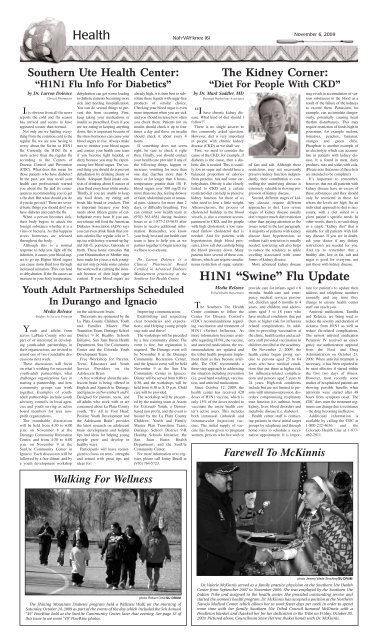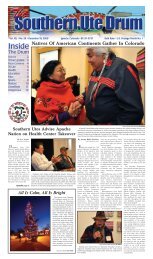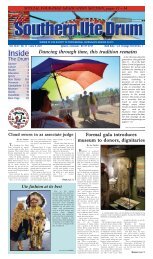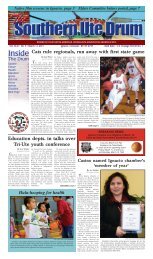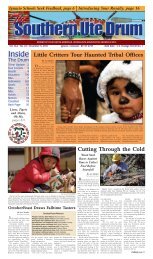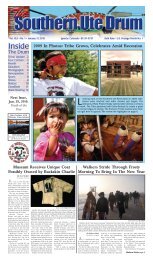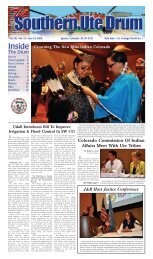Download - Southern Ute Indian Tribe
Download - Southern Ute Indian Tribe
Download - Southern Ute Indian Tribe
Create successful ePaper yourself
Turn your PDF publications into a flip-book with our unique Google optimized e-Paper software.
November 6, 2009<br />
Health Nah-VAY-knee (6)<br />
<strong>Southern</strong> <strong>Ute</strong> Health Center:<br />
“H1N1 Flu Info For Diabetics”<br />
by Dr. Larron Dolence<br />
Clinical Pharmacist<br />
It is obvious from all the news<br />
reports the cold and flu season<br />
has arrived and seems to have<br />
appeared sooner than normal.<br />
Not only are we battling everything<br />
from the common cold to the<br />
regular flu, we are now having to<br />
worry about the Swine or H1N1<br />
flu. Currently, the H1N1 flu is<br />
more active than the regular flu<br />
according to the Centers of<br />
Disease Control and Prevention<br />
(CDC). What does this mean for<br />
those patients who have diabetes?<br />
In the past, you may recall your<br />
health care professionals warned<br />
you about the flu and its consequences<br />
recommending you to get<br />
a flu shot. But what should you do<br />
if you do get sick? There are several<br />
basic things you should do if you<br />
have diabetes and catch the flu.<br />
When a person becomes sick,<br />
their body begins to attack the<br />
foreign substance whether it is a<br />
virus or bacteria. As this happens<br />
stress hormones are released<br />
throughout the body.<br />
Although this is a normal<br />
response to help you fight off the<br />
infection, it causes your blood sugars<br />
to go up. Higher blood sugars<br />
can cause more fluid loss through<br />
increased urination. This can lead<br />
to dehydration. If the flu causes an<br />
increase in your body temperature,<br />
dehydration can get worse leading<br />
to diabetic patients becoming more<br />
sick and needing hospitalization.<br />
You can do several things to prevent<br />
this from occurring. First,<br />
keep taking your medications or<br />
insulin as prescribed. Even if you<br />
are not eating or keeping anything<br />
down, this is important because of<br />
the stress hormones can cause your<br />
blood sugars to rise. Always make<br />
sure to monitor your blood sugars<br />
and contact your health care team<br />
if you become light headed, or<br />
dizzy because you may be experiencing<br />
low blood sugars. The second<br />
thing you should do is prevent<br />
dehydration by drinking plenty of<br />
fluids. Adequate fluid intake consists<br />
of drinking about 8 ounces of<br />
clear fluid every hour while awake.<br />
Thirdly, if you are unable to keep<br />
any food down, try eating soft<br />
foods like bread or crackers. This<br />
is important because your body<br />
needs about fifteen grams of carbohydrate<br />
every hour. If you cannot<br />
tolerate soft food the American<br />
Diabetes Association (ADA) says<br />
you can even drink fluids that contain<br />
calories like regular cola or 7-<br />
up, tea with honey, warmed-up liquid<br />
Jell-O, popsicles, Gatorade or<br />
broth. These home remedies that<br />
your Grandmother or Mother may<br />
have made for you as a sick youngster<br />
not only provide some calories<br />
but work well at calming the stomach<br />
because of their high sugar<br />
content. If your blood sugars are<br />
already high, it is then best to substitute<br />
these liquids with sugar-free<br />
products of similar choice.<br />
Checking your blood sugar is even<br />
more important when you are sick<br />
and you should increase how often<br />
you check them. Patients not on<br />
insulin should check it up to four<br />
times a day and those on insulin<br />
should check it about every 4<br />
hours.<br />
If something does not seem<br />
right, be sure to check it right<br />
then. Finally, you should contact<br />
your health care provider if any of<br />
the following things happen or<br />
increase: vomiting for more than<br />
one day, diarrhea more than 5<br />
times or for longer than 6 hours,<br />
temperature greater than 101 F,<br />
blood sugars over 300 mg/dl for<br />
more than one day, feeling drowsy<br />
or faint, abdominal pain or unusual<br />
pain, sickness for more than 2<br />
days, or difficulty breathing. You<br />
can contact your health team at<br />
(970) 563-4581 during business<br />
hours or at 1-877-215-9635 after<br />
hours to receive additional information.<br />
Remember, you know<br />
your body best and our health care<br />
team is here to help you as we<br />
partner together to begin restoring<br />
wellness to everyone.<br />
Dr. Larron Dolence is a<br />
Clinical Pharmacist Board<br />
Certified in Advanced Diabetes<br />
Management practicing at the<br />
<strong>Southern</strong> <strong>Ute</strong> Health Center.<br />
Youth Adult Partnerships Scheduled<br />
In Durango and Ignacio<br />
Media Release<br />
Bridges To Success Program<br />
Youth and adults from<br />
across LaPlata County who are<br />
part of or interested in developing<br />
youth-adult partnerships in<br />
their organizations, are invited to<br />
attend one of two roundtable discussions<br />
next week.<br />
These discussions will focus<br />
on what’s working for successful<br />
youth-adult partnerships, what<br />
challenges organizations face in<br />
starting a partnership, and how<br />
community groups can work<br />
together. Examples of youthadult<br />
partnerships include youth<br />
advisory councils in local agencies<br />
and youth serving as active<br />
board members for area nonprofit<br />
organizations.<br />
The roundtable discussions<br />
will be held from 4:30 to 6:00<br />
p.m. on November 8 at the<br />
Durango Community Recreation<br />
Center, and from 4:30 to 6:00<br />
p.m. on November 9 at the<br />
Sun<strong>Ute</strong> Community Center in<br />
Ignacio. Each discussion will be<br />
followed by a free dinner, and by<br />
a youth development workshop<br />
on the adolescent brain.<br />
The events are sponsored by the<br />
La Plata County Children, Youth<br />
and Families Master Plan<br />
Transition Team, Durango School<br />
District 9 R Healthy Schools<br />
Initiative, San Juan Basin Health<br />
Department, Sun <strong>Ute</strong> Community<br />
Center and the Colorado Youth<br />
Development Team.<br />
Free Workshop for Parents,<br />
Teens, Educators and Youth<br />
Service Providers on the<br />
Adolescent Brain<br />
A free workshop about the adolescent<br />
brain is being offered in<br />
English and Spanish in Durango<br />
and Ignacio on November 8 and 9.<br />
Designed for parents, teens, and<br />
all adults who work with or are<br />
concerned about La Plata County<br />
youth, “It’s All in Your Head:<br />
Positive Youth Development and<br />
the Adolescent Brain” provides<br />
the latest research on adolescent<br />
brain development and helpful<br />
tips and ideas for helping young<br />
people grow and develop in<br />
healthy ways.<br />
Participants will leave reenergized<br />
to focus on teens’ strengths<br />
and armed with great tips and<br />
ideas for:<br />
Improving communication;<br />
Establishing and respecting<br />
clear boundaries and expectations;<br />
and Helping young people<br />
stay safe and thrive!<br />
The workshops will be preceded<br />
by a free community dinner. The<br />
event is free, but registration is<br />
required. The Durango event will<br />
be November 8 at the Durango<br />
Community Recreation Center,<br />
and the Ignacio event will be held<br />
November 9 at the Sun <strong>Ute</strong><br />
Community Center in Ignacio.<br />
Dinner will be served from 6:00 to<br />
6:30, and the workshops will be<br />
held from 6:30 to 8:15 p.m. Child<br />
care will be provided.<br />
The workshop will be presented<br />
by the training team at Assets<br />
for Colorado Youth, a Denverbased<br />
non profit, and the event is<br />
hosted by the La Plata County<br />
Children, Youth and Family<br />
Master Plan Transition Team;<br />
Durango School District 9-R<br />
Healthy Schools Initiative; the<br />
San Juan Basin Health<br />
Department; and the Sun<strong>Ute</strong><br />
Community Center.<br />
For more information or to register,<br />
please call Jenny Bruell at<br />
(970) 764-5723.<br />
The Kidney Corner:<br />
“Diet For People With CKD”<br />
by Dr. Mark Saddler, MD<br />
Durango Nephrology Associates<br />
Media Release<br />
Tribal Health Department<br />
The <strong>Southern</strong> <strong>Ute</strong> Health<br />
Center continues to follow the<br />
Center for Disease Control’s<br />
(CDC) recommendations regarding<br />
vaccination and treatment of<br />
H1N1 (Swine) Influenza. As<br />
more information becomes available<br />
regarding H1N1, the vaccine,<br />
and antiviral medications, the recommendations<br />
are updated and<br />
the tribal health programs implement<br />
them as they become available.<br />
The CDC recommends a<br />
three-step approach to addressing<br />
the situation including prevention<br />
(i.e. good hand washing), vaccination,<br />
and antiviral medications.<br />
Since October 12, 2009, the<br />
health center has received 420<br />
doses of H1N1 vaccine, which is<br />
only 15% of the doses needed to<br />
vaccinate the entire health center’s<br />
active users. This includes<br />
both intranasal (inhaled) and<br />
intramuscular (injection) vaccine.<br />
The initial supply of vaccine<br />
has been given to pregnant<br />
women, persons who live with or<br />
“I have chronic kidney disease.<br />
What kind of diet should I<br />
follow?”<br />
There is no single answer to<br />
this commonly asked question.<br />
However, diet is very important<br />
in people with chronic kidney<br />
disease (CKD) as we shall see.<br />
First, we need to consider the<br />
cause of the CKD. For example, if<br />
diabetes is the cause, then a diabetic<br />
diet is needed. This is usually<br />
low in sugar and should have a<br />
balanced proportion of calories<br />
from proteins, fats and some carbohydrates.<br />
Obesity is also closely<br />
linked to CKD and a calorie<br />
restricted diet can help to preserve<br />
kidney function for those of us<br />
who need to lose a little weight.<br />
Atherosclerosis, the process of<br />
cholesterol buildup in the blood<br />
vessels, is also a common accompaniment<br />
to CKD, and for people<br />
with high cholesterol, a low saturated<br />
fat/low cholesterol diet is<br />
needed. And for patients with<br />
hypertension (high blood pressure),<br />
a low salt diet can help bring<br />
the blood pressure down. Many<br />
patients have several of these conditions,<br />
which can require simultaneous<br />
restriction of sugar, saturated<br />
fats and salt. Although these<br />
restrictions may not necessarily<br />
preserve kidney function independantly,<br />
their contribution to controlling<br />
the underlying disease is<br />
extremely valuable in slowing progression<br />
of kidney disease.<br />
Second, different stages of kidney<br />
disease require different<br />
approaches to diet. Less severe<br />
stages of kidney disease usually<br />
don’t require much diet restriction<br />
other than paying attention to the<br />
issues noted in the last paragraph.<br />
A majority of patients with kidney<br />
disease have hypertension, so<br />
sodium (salt) restriction is usually<br />
needed; restricting salt also helps<br />
to reduce the tendency to ankle<br />
swelling associated with some<br />
forms of kidney disease.<br />
More advanced kidney disease<br />
may result in accumulation of various<br />
substances in the blood as a<br />
result of the failure of the kidneys<br />
to excrete them. Potassium, for<br />
example, can accumulate dangerously,<br />
potentially causing heart<br />
rhythm disturbances. This may<br />
require restriction of foods high in<br />
potassium, for example melons,<br />
tomatoes, peaches, bananas,<br />
oranges and green chile.<br />
Phosphate is another example of<br />
an electrolyte which can accumulate<br />
in patients with kidney disease.<br />
It is found in meat, dairy<br />
products, nuts and sodas with cola.<br />
(Please note that none of these lists<br />
are intended to be complete!)<br />
It’s important to remember,<br />
however, that not all patients with<br />
kidney disease have an excess of<br />
these substances and they should<br />
only be restricted in those for<br />
whom the levels are high. So an<br />
individual approach to diet is necessary,<br />
with a diet suited to a<br />
given patient’s specific needs. In<br />
other words, there is no such thing<br />
as a single “kidney diet” that is<br />
suitable for all patients with kidney<br />
disease. If you are in doubt,<br />
ask your doctor if any dietary<br />
restriction/s are needed for you.<br />
And try to remember that a<br />
healthy diet, low in fat, salt and<br />
sugar is good for everyone, not<br />
just those with kidney disease.<br />
H1N1 “Swine” Flu Update<br />
Farewell To McKinnis<br />
provide care for infants aged < 6<br />
months, health-care and emergency<br />
medical services personnel,<br />
children aged 6 months to 4<br />
years, and children and adolescents<br />
aged 5 to 18 years who<br />
have medical conditions that put<br />
them at higher risk for influenza<br />
related complications. In addition<br />
to providing vaccination at<br />
the clinic, health center and academy<br />
staff provided vaccination to<br />
children enrolled at the academy.<br />
On November 2, 2009, the<br />
health center began giving vaccine<br />
to persons aged 25 to 64<br />
years who have medical conditions<br />
that put them at higher risk<br />
for influenza-related complications<br />
and persons aged 5 years to<br />
24 years. High-risk conditions<br />
include but are not limited to persons<br />
with immunosupression, disorders<br />
compromising respiratory<br />
tract function (i.e. asthma), heart,<br />
kidney, liver, blood disorders and<br />
metabolic disease (i.e. diabetes).<br />
Health center staff is contacting<br />
patients in these initial target<br />
groups by telephone and through<br />
home visits to schedule a vaccination<br />
appointment. It is important<br />
for patient’s to update their<br />
address and telephone numbers<br />
annually and any time they<br />
change to ensure health center<br />
staff can reach you.<br />
Antiviral medications, Tamiflu<br />
and Relenza, are being used to<br />
reduce the severity and duration of<br />
sickness from H1N1 as well as<br />
reduce flu-related complications.<br />
The newest antiviral medication<br />
Peramivir IV received an emergency<br />
use authorization approval<br />
from the Food and Drug<br />
Administration on October 23,<br />
2009. When antiviral treatment is<br />
necessary, it has been reported to<br />
be most effective if started within<br />
the first two days of illness.<br />
However, most recently some<br />
studies of hospitalized patients are<br />
showing possible benefits when<br />
antivirals were started after 48<br />
hours from symptom onset. The<br />
CDC does warn the treatment regimens<br />
can change due to resistance<br />
– the drug becoming ineffective.<br />
Additional information is<br />
available by calling the CDC at<br />
1-800-232-4636 and the<br />
Colorado Health Line at 1-877-<br />
462-2911.<br />
Walking For Wellness<br />
photo Robert Ortiz/SU DRUM<br />
The Shining Mountain Diabetes program held a Wellness Walk on the morning of<br />
Saturday, October 24, 2009 as part of the events of the day which included the 5th Annual<br />
“49” PowWow held at the Sun<strong>Ute</strong> Community Center, later that evening. See page 12 of<br />
this issue to see more “49” PowWow photos.<br />
photo Jeremy Wade Shockley/SU DRUM<br />
Dr. Valerie McKinnis served as a family practice physician at the <strong>Southern</strong> <strong>Ute</strong> Health<br />
Center from September 2007 to November 2009. She was employed by the <strong>Southern</strong> <strong>Ute</strong><br />
<strong>Indian</strong> <strong>Tribe</strong> and assigned to the health center. She provided outstanding service and<br />
started the women’s health program. Dr. McKinnis has accepted a position at the Northern<br />
Navajo Medical Center, which allows her to work fewer days per week in order to spend<br />
more time with her family. <strong>Southern</strong> <strong>Ute</strong> Tribal Council honored McKinnis with a<br />
Pendleton blanket and thanked her for her dedication to the <strong>Tribe</strong> on Friday, October 30,<br />
2009. Pictured above, Councilman Steve Herrera shakes hands with Dr. McKinnis.


